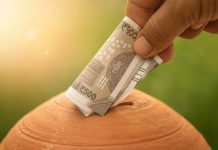GBP/INR has managed to break above 95.000 after several failed attempts. Currently, one British pound buys 95.403 Indian rupees, up 0.42% as of 6:10 AM UTC. Yesterday, the pair tested the support line of an uptrend that turned steeper at the end of May. It then returned to follow the general ascension and broke above 95.000, touching the highest level since April 20.
The rupee is losing ground as India’s consumer confidence has collapsed during the pandemic and may end up in an economic contraction of 1.5% in the fiscal year 2020-21. The Consumer Confidence Survey (CCS) report released by the Reserve Bank of India (RBI) on Friday suggests that households’ mood fell to the lowest level on record. The Future Expectations Index (FEI) is showing a record decline as well.
Another survey sponsored by the central bank says that the Indian economy might contract by 1.5% in the current fiscal year. It would be the worst performance in the country’s history. During the first week of India’s lockdown measures, economists still expected the gross domestic product (GDP) to show some growth. The survey says that the economy might recover in 2021-22 by gaining 7.2%.
Pound Is Up Despite UK’s Gloomy Data
The sterling manages to stay strong despite a series of weak economic data. British consumer confidence also returned close to the lowest level on record at the end of May, polling firm GfK said. The index dropped to -36 in the second half of May, from -34 in the first two weeks.
GfK’s client strategy director Joe Staton explained:
“With no sign of a rapid V-shaped bounce-back on the cards, consumers remain pessimistic about the state of their finances and the wider economic picture for the year to come.”
Meanwhile, the UK’s labor market was still bleeding in May, though the pace of decline slowed. The index of demand for staff, released by the Recruitment and Employment Confederation (REC) and KPMG, increased to 19.3 from 9.3 in April. The survey’s 50 mark separates growth from contraction.
Even though the British economy shows clear signs of a deep recession, the pound could leverage the optimism about reopening of the economy and the hope that recovery will be rapid.





